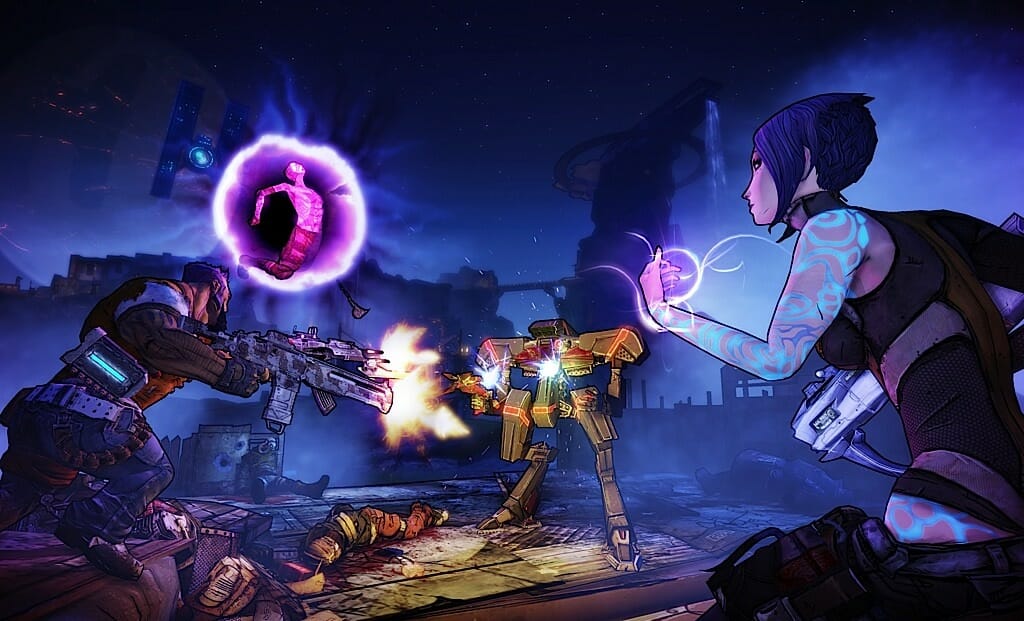Borderlands 2 (Multi-Platform)

Smart game designers know how to keep the controller in your hands by combining smaller, more frequent rewards with longer-term goals that always seem tantalizingly within reach. What’s interesting about Borderlands 2 is how naked these machinations are. At root, the appeal of Borderlands 2 is acquisition. It is a non-stop hunt for better weapons, armor, and abilities, in which you’re always convinced that your prized possession awaits at the end of the next quest—or, hey, maybe it’s hiding in the nearest outhouse. Better check to make sure. And that sniper rifle you’ve been toting around for hours, the one with a high chance to set enemies on fire and bonus critical damage, which has seen you safely through the toughest battles of your life? The second you find something even a little better, you dump it like yesterday’s croissants. This is like the ultimate capitalism simulator: whoever dies with the best stuff wins.
That stuff, most often, is guns. As in its predecessor, Borderlands 2 promises a near-infinite variety of randomly generated firearms to suit most any play style. It gets there by mixing and matching several garden-variety stats—damage, accuracy, reload speed, capacity—with the standard array of assault rifles, pistols, shotguns, and so on, and throwing in a few advanced features. The most useful guns offer elemental attacks, which, beyond the initial impact, have a chance to deal persistent damage. Especially in later stages, combat becomes a rock-paper-scissors affair: A shock weapon will sap an enemy’s energy shields, but you’ll want to switch to flame rounds to char its flesh for the killing blow. Guns come from different manufacturers, each with its own unique characteristics. All else being equal, a sniper rifle from the Hyperion Corporation will also be more accurate than one from Vladof.
While it’s true that nothing’s better than finding a new weapon that beats the pants off of anything else in your arsenal, a reality check is in order. Most of the drops you find, whether from fallen enemies or from the thousands of containers dotting the landscape, are clearly inferior to what you’re already wielding. Mastering elemental attacks is crucial for boss battles, but for standard baddies, one weapon is generally as good as another, especially if you’ve powered up by grinding out additional levels through side missions. And for all the variables that go into the game’s “gazillion” guns, it’s not uncommon to find yourself scrutinizing two nearly identical pieces, trying to figure out which one actually gives you the advantage.

Your best chance for varied combat abilities in Borderlands 2 comes from developing your character’s skill tree. Borderlands 2 has four classes to start with, each of which has a unique action skill, which unlocks once the character reaches level 5. From there, each class has three distinct tracks available to them, which can be mixed and matched if desired. The number of possibilities is dizzying. Not only are skill points doled out sparingly, just one per level, but when you’re staring at all those tempting options, it’s always apparent how many of them you’re choosing not to get. If you’re anything like me, deciding how to spend each point is an unduly agonizing decision. Press A for regret.
For this review, I played as the assassin Zer0, and spent my skill points building up his “Bloodshed” track. This is a melee-focused set of abilities, which eventually allowed Zer0 to wade into combat and deal massive damage with his sword while remaining invisible to his foes. Thing is, it takes a while to get there. Most of the upgrades are incremental. You’ll unlock a new ability and then power it up several times, without any apparent impact. For example, you might go from a 300% damage bonus to a 400% damage bonus under certain conditions, which is the kind of thing that looks great on a spreadsheet, and is all but unnoticeable in the game. (“Yep, still slicin’ up dudes with my sword…”) That means it often takes several levels to get a new game-changing ability. Good things do come to those who wait, but impatient people have needs too.
-

-

-

-

-

-

-

-

-

-

-

-

-

-

-

-

-

-

-

-

-

-

-

-

-

-

-

-

-

-

-

-

-

-

-

-

-

-

-

-








































